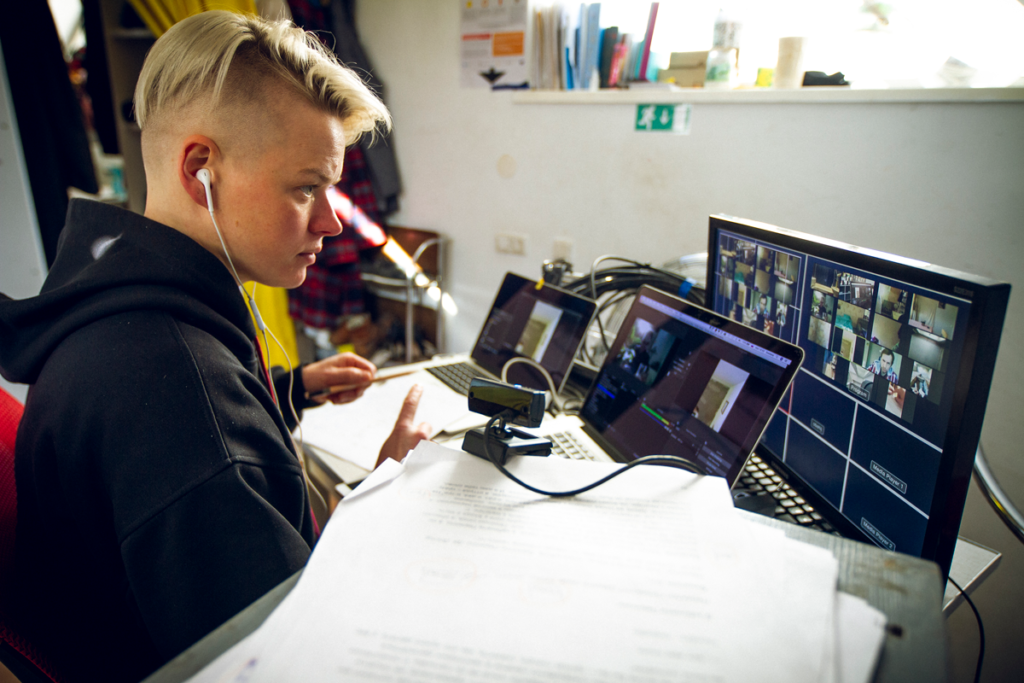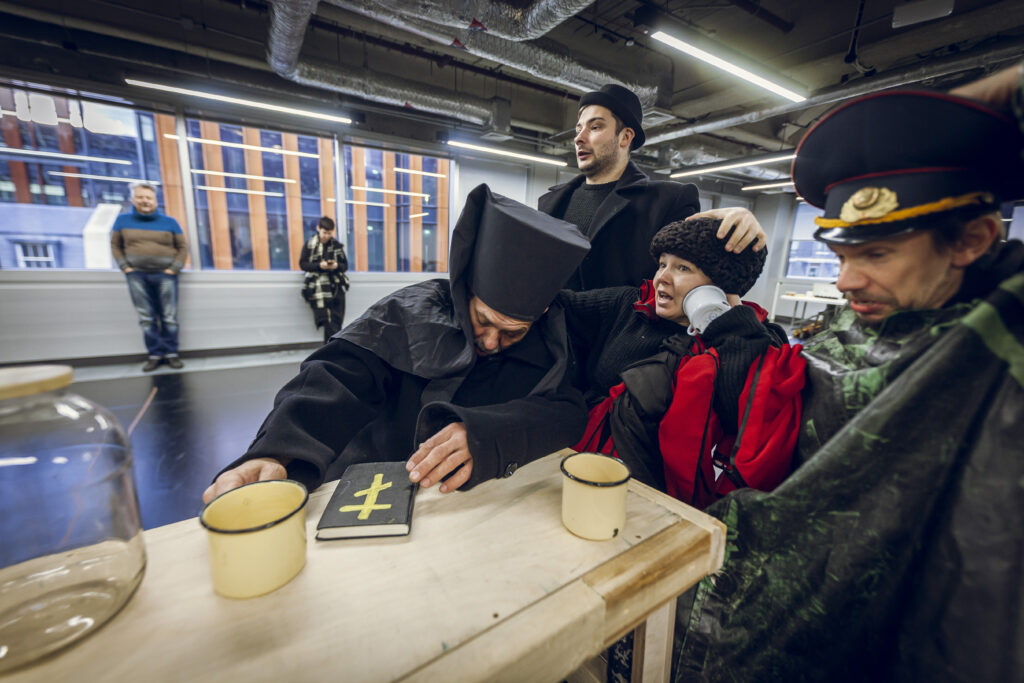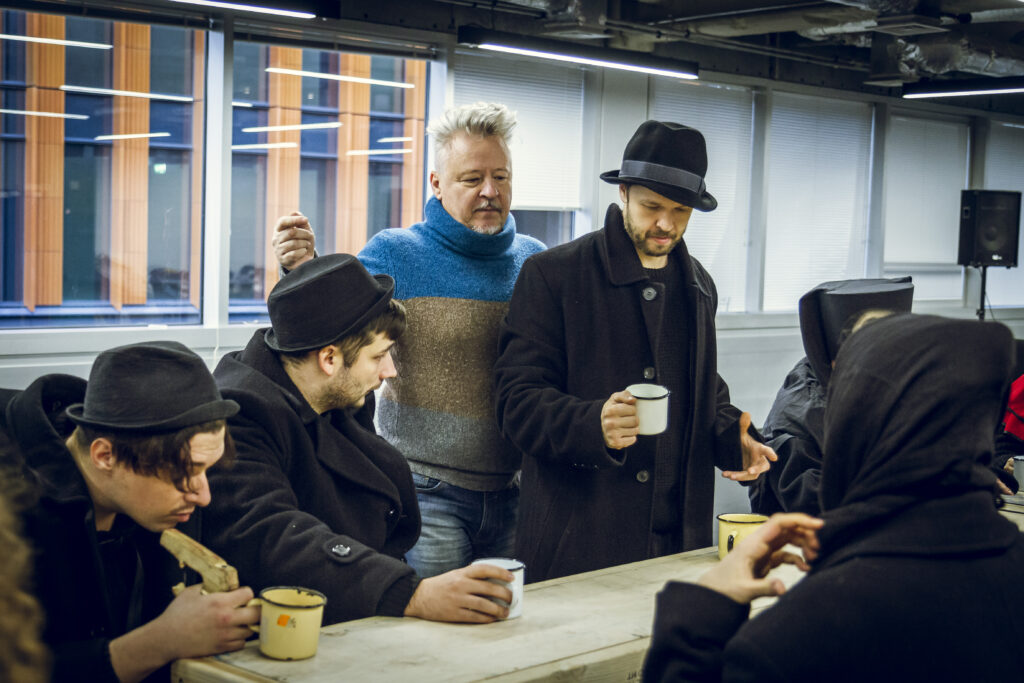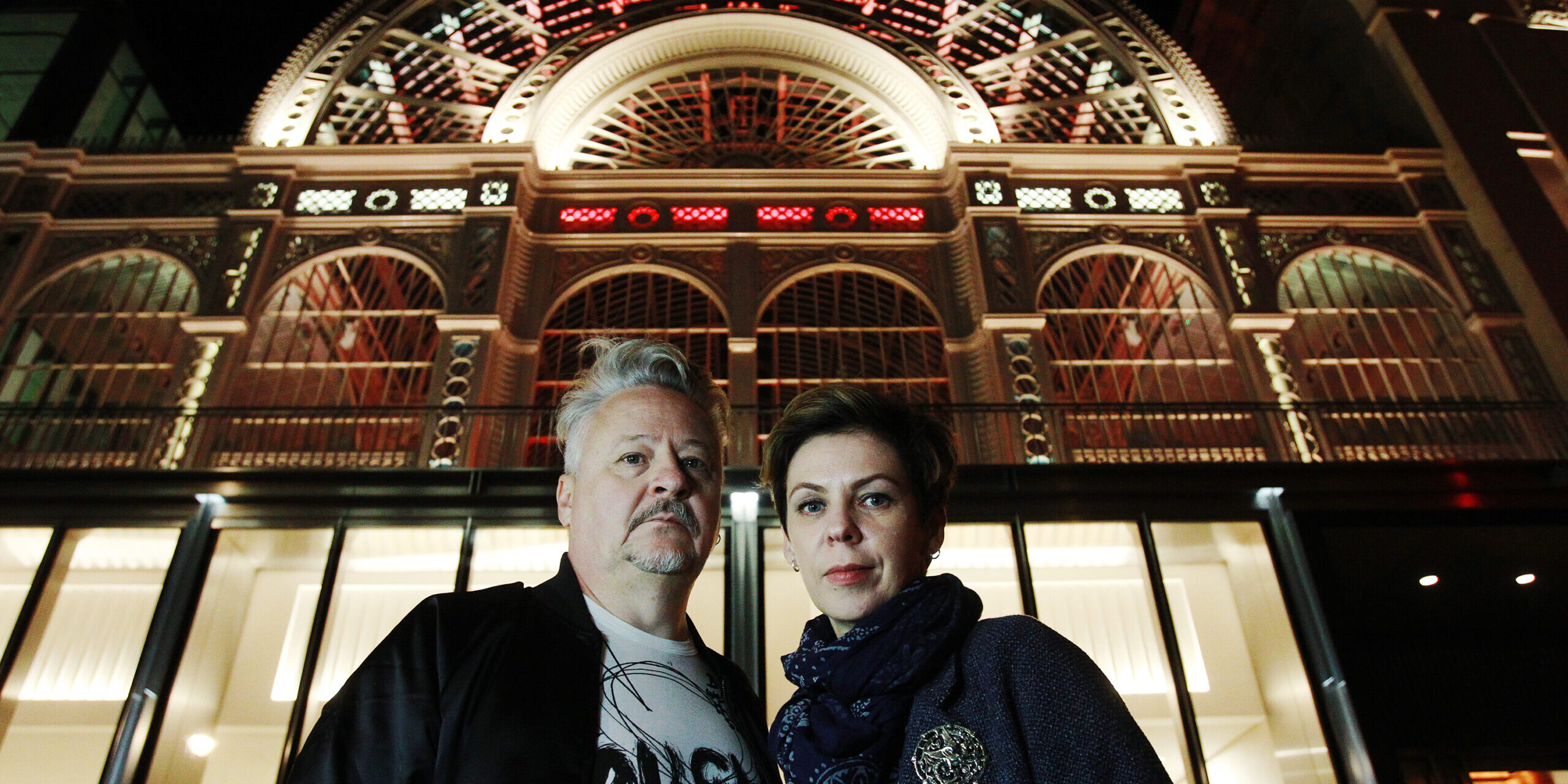After almost 17 years of making work underground, the Belarus Free Theatre ensemble has been forced to leave their home country because it was no longer safe. Tom Mustroph spoke to co-director Natalia Kaliada and company manager Svetlana Sugako about the reasons they felt it necessary to escape, their ongoing work in Belarus and abroad – and their future plans.
Belarus Free Theatre has been making work underground in its home country for almost 17 years now under the repressive dictatorship of Alexander Lukashenko. Over this time, they have had to operate in the shadows, frequently facing arrest, threats and persecution. The founders and co-directors of the group, Natalia Kaliada and Nicolai Khalezin have been living in exile fin the UK for 10 years now, though they have maintained an infrastructure in Belarus and remained a very important cultural player in the country. Recently, however, the member of the company still based in Belarus – including the manager Svetlana Sugako – felt it necessary to flee the country themselves.
Tom Mustroph: What was the initial reason for bringing out the members of the company who lived and worked in Belarus?
Natalia Kaliada: Our company was in resistance for all the 17 years of our existence. We were leading the cultural front against the regime. Our company members had been arrested over the years. We had to flee the country 10 years ago. But since 2020 the scale of violence moved to unprecedented level. It was necessary to make an emergency exit. The last [straw] was when we were on the phone with our managing director Svetlana Sugako, who was in jail already, and as we spoke, she told us, “Wait a second, [the] police are coming to my house.” It was clear, it is not possible to continue.
TM: Svetlana, you were in Belarus all the time. How did you live through that experience?
Svetlana Sugako: I do not know where to start. After the election on the 9th August 2020, Lukashenko tried to oppress every protest with the whole power of his system, with the KGB. We were so angry. Me and my partner and another actress from Belarus Free Theatre were just kidnapped from the streets. We spent five days in jail. The conditions were like hell. We were just trying to survive.
TM: What was going on there?
Sugako: We were 36 women in a cell for four people. It was even hard to breath there. We had no food, no water to drink. All the time there was shouting. We heard how a man was beaten by the police. It was just torture. After five days we were released. And we thought, this is it. Lukashenko is done, and now the country will grow. We’ll start to build another country. We had no doubt of it. We saw, how people supported each other. And we thought, till the end of the year, we will have elections. But now it is the end of another year. Nothing changed in a good way. How Lukashenko and his staff are behaving now is kind of like 1937.

Svetlana Sugako
TM: You are referring to the political trials in the Soviet Union against Bolshevik legends Nikolai Bucharin, Grigori Sinoviev and the military leader Michail Tuchachevski?
Sugako: It is like that. You wait all the time for the KGB to come to your place. You know, it will happen. You just do not know the date. With each car driving near your home, you think, okay, probably it is for me. Then it’s not for you and you probably breath out, but you know, the next one will come, for sure. It is not even scary, because you know it will happen. You are just waiting. At this moment we understood it is a choice without choice. We could stay in the country and end up in jail, not for days, but for years. Or leave the country. And this is why we left.
Kaliada: What is amazing is that our guys in Belarus were saying that they were ready to go to jail for a long time. But in jail it is not possible for us to continue to perform. And this is a major tool, that we have. So, first of all, it was for safety and security reasons. But this emergency exit for the whole company is also a major victory for us, because we are able to continue to perform. We can keep Belarus on the agenda, and our performances can seen by our audience inside Belarus. It is one of the main priorities for us not to leave our audience alone with the regime. And by showing and streaming {out work], we prove that we are stronger than dictatorship.
TM: Is the streamed work visible in Belarus? It’s not blocked?
Kaliada: We need to find ways to overcome the firewalls, but we always find them.
TM: What is the situation like now? What are your immediate plans?
Sugako: The whole company is in London, but in a few days we will go to Poland, where we can stay and work.
TM: For how long?
Sugako: Hard to say. I do not have any expectation of Belarus government. Lukashenko plays a game with no rules. Of course, I wish it would be only a few weeks or months, but maybe it is two years. Poland will be a place where it is safe for us, and we appreciate this a lot. But I do not want to make roots there, because my roots are in Belarus. My home is in a village near Minsk. And I want to go back home and help to create a beautiful country.
Kaliada: Everyone is waiting for changes in Belarus. The problem is the EU and USA are not doing enough. There are a lot of words with major bureaucratic delays. This allows the dictator to regroup. For now, we hope, that the Polish will embrace the company because we have these unique educational methods and we will continue to teach our students online. We will also work with child refugees from Belarus. There is a major demand for our methods to convert stories from repressed people into art.
TM: Do you use some of the techniques of the Theatre of the Oppressed?
Kaliada: No, it’s our own method, the ‘total immersion method’. We developed it 17 years ago and teach it in major universities in the USA, in Europa and also in Africa. Now it will be available for child refugees in Poland.
TM: You chose Poland for the company because it’s close to Belarus, but also because a lot of Belarussian people are already there and also need art and psychological help through art?
Kaliada: We are there where we are needed.

Belarus Free Theatre’s Dogs of Europe in rehearsal. Photo: Kolia Kuprich
TM: How would you describe the situation for yourself: Are you refugees travelling from London to Warsaw or are you a theatre company abroad on a very particular tour?
Sugako: It is closer to the second explanation. We are not refugees; we don’t want to be refugees. We are doing our work outside the country and are ready to go home.
TM: You have also established an underground acting school in Belarus. What will happen with your pupils? Are they still in Belarus, are they in danger?
Kaliada: Nobody knows who our students are because we always kept their faces and names under complete embargo. Nobody could identify them as our students. That allows us to continue to teach them. We also collaborate with our people inside Belarus, Nicolai [Khalezin, co-founder of Belarus Free Theatre] is running workshops for teenagers. So we still exist in Belarus. The only difference is, we are not able to perform face to face. While our guys were inside Belarus, we were also not able to put our shows online, because when shows are online, authorities can identify faces better and could arrest the people. But these shows now we can stream, which is an advantage in sad circumstances.
And Dogs of Europe [based on the novel of the Belarus author Alhierd Bacharevic, which was shown already underground in Belarus} will be shown in March on the main stage of the Barbican Theatre in London. It will be staged in the Belarussian language. For that people get arrested – because the book is banned in Belarus. So it’s major cultural event for Belarus and for Europe.
TM: Svetlana, what was the situation in Belarus like after you were released from jail until your departure? Did you dare to continue with the theatre work or was everybody frightened?
Sugako: It was both. Of course, we were scared. But we played underground for 16 years already. We had this fear with us for all that time and we know how to go through it. So, we continued to perform in underground venues, but also in a lot of communities. People built up a Telegram chat. Almost every home had its own Telegram chat, where they decided what to do. Some days we were just traveling to backyards and putting on performances there.
TM: Like a special theatre delivery to the home?
Sugako: Exactly. We were always a company who was very close to our audience. In our performances there it is no fourth wall. We involve people in our performances. But here it was a completely different situation. It turned around; we were involved with them. It was very special, a unique moment. And people understood very well that the KGB could come and grab us. So they also protected us and organized security. There was a car prepared, in case we had to run away very quickly. It was a community – the whole country was a community.
TM: What kind of change did you see over the years in your audience? And did it change with the 2020 elections?
Sugako: There was a very visible change in society. Probably, it was Victor Babarika, the candidate who ran for president. He gave everyone the belief that life depends on each of us. People started to think this way. They realized: “Okay, it is up to us to make a change. We can do it.” And people started to act.
TM: So it was also a change from the post-Soviet mentality? From the habit of suffering and complaining, of criticizing things but also obeying and not taking responsibility?
Sugako: Yes. We also understood that nobody will come and save us. We only can save ourselves. And even now, when 900 people are political prisoners, people continue to act. Each day we can see in the news, that some volunteers have helped the political prisoners, to send them something in jail, and they are also arrested and put into jail. But people continue to act.
TM: So the spirit of change is still there? It has not got lost under repression and disappointment?
Sugako: The spirit has not gone. We all do something for a better country. But it is hard because of the violence and the danger. You can stay with this spirit in the country, you can stay with this spirit in jail, but what can we change from inside the jail for the country?
There are some 900 political prisoners now. How many political prisoners do there need to be in Belarus before the European Union or the UK or the USA starts to do something? 9.000 or 90.000? How many? If there is a number which is necessary for them to take action, then we will go back right now.

Nicolai Khalezin (centre) directs rehearsals of Dogs of Europe. Photo: Kolia Kuprich
TM: Natalia, you are in Brussels now, what should the EU do?
Kaliada: We are pushing them for much stronger actions. Everybody understands that the regime is at its end now. [Even] Lukashenko understands. But the question is, how long it will take and how many people will die in this process? That is the major question for the EU, UK and USA. There is no proper strategy in place. The EU continues to wait and see. They have already seen rapes, tortures, murders, the hijacking of the air plane, exploitation of refugees. What else does the EU want to see? What are they waiting for?
TM: In global news, the reporting of the situation in Belarus mainly concerns the refugee game Lukashenko is playing at the borders with Lithuania and Poland. Does the Belarussian public “buy” this political theatre about the evil European Union, who shoots refugees and Lukashenko as their saviour?
Sugako: I am sure that Belarussians are not as stupid as Lukashenko thinks about them. Of course, everyone understands his game with people’s lives. He wants foreign politicians to talk with him so that he can act as a president. But he is not our president, we have not chosen him, he has occupied the country. He uses dirty tools to remain in power. If he wanted to help people, why did he not provide food, jobs and all that stuff? But he plays with lives. People are dying in the woods, and he does not care. He was killing Belarussians; he kills everybody in order to stay [in power] longer and to have more and more money.
TM: Natalia, when you look back 10 years, when you and your husband Nicolai had to escape from Belarus, and now you see the next generation doing the same, is that a very sad moment for you or maybe a good sign, because it indicates, that the regime is closer to its end?
Kaliada: It is exactly this feeling. At the beginning we were a small group of people and went through a lot of oppression. We were losing friends, people were kidnapped and killed. But now, when the pain touched the majority of our people, a new nation was born. That the most important thing. We just have to continue.
Sugako: You know, I wish we could build a new country now. And actually that is what we are probably doing, inside and outside the country. We realize, when we continue, Belarus will be a diamond inside Europe.
TM: That is something only few people outside Belarus expect.
Sugako: Inside Belarus you could feel it. I saw it the eyes of the people when I got out of jail on the 15th August. So many people were protesting and helping each other. Even if you were blind, you could feel this energy of love. And you wish that your country will shine. And now, while we are talking about it, I feel it again,
TM: Listening to you I was thinking about East Germany in 1989. It felt very familiar to the emotions you described now. The only problem is that my generation in East Germany messed it up. The country we have now does not match the expectations we had more than 30 years ago. And the same could be said about the development of a lot of other countries in the former Eastern bloc and the former Soviet Union. I hope, you do not mess it up now, don’t you?
Well I couldn’t promise. But I will try. We will do our best. The good thing is, when you see how Svetlana Tikhanovskaya [the former presidential candidate, whose husband has just been jailed for 18 years] runs her office. Never were we that close and connected to Europe, communication was never so good. She is an example for all of us. And imagine, how the whole country would be if run by that spirit and professionality!
Read Natasha Tripney’s piece on Belarus Free Theatre’s new documentary Alone about the activism of Ukrainian rock star Andriy Khlyvnuk
You can find a list of political prisoners in Belarus here.
For more information on Belarus Free Theatre’s campaigning an activities, or to support them, visit their website
Tom Mustroph works in Berlin and Palermo as a freelance journalist and dramaturg. He operates in several journalistic fields, such as theatre, fine arts and sports. He is most interested in how self-responsible work can succeed elegantly and in accordance to minimal moral standards. He collaborates with several German language publications such as taz, FAZ, Neues Deutschland, NZZ, Theater der Zeit, zeit online, Deutschlandfunk and WDR.








